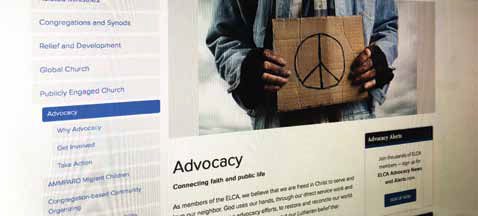by Amy Reumann
The pastor of a small-town congregation came to my office door with a plea. He wanted to know why the regional food bank that supplied his church’s pantry had suddenly cut back on the food staples they relied on. Demand in the community was up, he said. The pantry was now routinely running out of food, and the volunteers had to turn people away each week. He wanted to know whether Lutheran Advocacy Ministry in Pennsylvania, an ELCA state public policy office where I served as director, could do anything about it.
The answer to the first question was easy. Food bank funding, a miniscule line in the state budget, had received a 10 percent cut, despite objections from food security specialists and faith-based advocates. That cut meant less nutrition assistance for churches and other organizations to distribute. Communities around the state were now beginning to feel the pinch. Other leaders beside him were also starting to ask, “Why?”
The second answer was less about what I could do, and more about what he, his congregation and other Lutherans around the state could do by lifting their voices to advocate for the restoration of funding. We discussed several possibilities. They could write letters to their legislators, visit those legislators in their offices and attend town hall meetings to raise their concerns. They could work with community members who relied on the pantry to help them tell their stories about what this assistance meant to them. They could educate themselves about the causes of widespread hunger, which in that area had a lot to do with a lack of affordable housing. This pastor and congregation soon became part of a faith advocacy movement to call their state government to better serve their neighbor.
Sometimes when congregations are interested in learning about advocacy—the practice of raising public support for a particular cause or policy—I ask them to list all the ways our congregations respond to human need. Prayer is usually first on the list, followed by direct service such as distributing food, building houses or other forms of charity. A close third is donating money. We quickly affirm that these are the areas where the church is most comfortable and effective in addressing immediate needs. Acts of charity use what we have in abundance–food and resources to share, as well as a theological commitment to respond to a loving God by loving and serving our neighbors.
Participants are less likely to list other possibilities. I may need to prompt them to consider actions that strive for greater justice by addressing long-term change in policy or becoming involved in advocacy, organizing, mobilization or activism. Illustrating the challenge for many of us, one woman said: “I get that we have to go beyond charity to really serve others. But I’ve never been equipped in church to do these things or seen getting political as part of my faith walk. How do I get started?”
How can you get started?
Here are steps you can take right now to begin standing for the least of these in your community:
Join the ELCA e-Advocacy Network. To receive legislative updates and key advocacy opportunities in your inbox, sign up for the ELCA e-Advocacy Network at elca.org/advocacy.
Reach out to your members of Congress by email, letter or phone—and encourage your congregation to do the same. Explain why, as their constituent, these issues affect you, your neighbors, your community and our larger world.
Invite your officials to visit your congregation’s ministry or project. Lawmakers are more likely to support helpful legislation when they see firsthand the needs of a community.
Build a relationship with the staff in your member of Congress’ state or district office. Invite regional staff to your congregation’s events. Visit their offices regularly. Let them know what positions you’d like your congressperson to take on crucial issues affecting our vulnerable neighbors and God’s creation.
Write a letter to the editor of a local newspaper, lifting up an issue of concern. Mention your elected officials by name and you will not only reach your fellow constituents, you will get the attention of your officials’ offices, also.
If your state has a Lutheran state public policy office, get involved in this ministry. The ELCA has offices strategically located in several state capitals to help ELCA members get involved in advocacy for hunger-related issues in the state legislature.
Amy serves the Gospel imperative to love our neighbor by seeking greater justice as Director of Advocacy for the ELCA. She has served congregations in New Jersey and Wisconsin, loves to garden, hang out with her kids, bake bread and read mysteries.



It must be nice however minuscule to get state money. How did that happen? South Carolina.